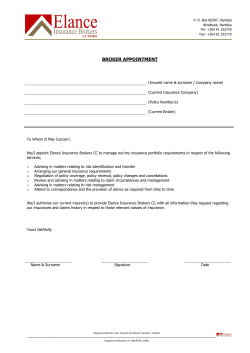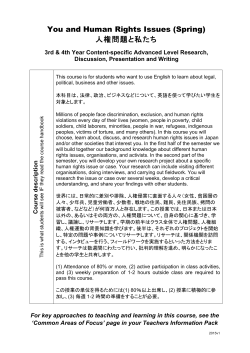
using assessment to inform retention academic advising practices
ENGAGING IN SELF-REFLECTION: USING ASSESSMENT TO INFORM RETENTION ACADEMIC ADVISING PRACTICES Denise Nakaoka, M.Ed. and Niki Libarios, Ph.D. Office of Student Academic Services (OSAS) Facts • 1 Director; 7 Academic Advisors • Total enrolled COE students served by OSAS = 1,268 students • Programs served: initial teacher licensure programs and undergraduate degree in kinesiology and rehabilitation science Primary Focus: OSAS Student Outcome #4 Students will identify factors that impact their academic progress. OSAS Student Outcomes 1. Students will identify their career goals and formulate an educational plan that will assist them in achieving their goals. 2. Students will be able to identify College and University policies that affect their education experience. 3. Students will utilize various OSAS advising support services. 4. Students will identify factors that impact their academic progress. Data • Approximately 200 students are placed on academic action every fall semester, approximately 150 every spring semester. • 74% return rate on retention survey submission. • Academic Difficulty was identified as the biggest factor for a decline in grades. • Personal Issues was the second most frequently cited reason. Online In-Person • Identify the reasons for your decline in grades last semester (choices include academic difficulty, financial hardship, personal issues, other) • Identify factors that impacted your grades. • How could the College of Education have helped you during this period? • What steps have you taken to improve the factors that impacted your grades last semester? • Are you aware of any campus support services? • What can you do to ensure that you will be in good academic standing in the future? Identify Academically At-Risk Students Introduction • In Fall 2012, the COE began admitting freshmen. • OSAS noticed an increase in students who struggled to maintain minimum GPA requirements. • OSAS expanded its retention efforts and developed a self-reflective assessment cycle aimed at assisting “academically at-risk students” who are placed on academic warning, probation, suspension, and dismissal. Self-Reflection Sample Questions Registration Hold Removed and Follow Up Self-Reflection Advising Encouraged Student Response Themes and Advisor Action Steps Advising Cycle with Student SelfReflection Advising Appointment • Survey responses guide further selfreflection that lead to interventions • Signed Academic Progress Agreement Students did not understand course content Placed Registration Holds and Sent Notification Letters Students Complete a SelfReflective Survey Advisors created a resource handout of on-campus support services Students were new to campus and felt overwhelmed Advisors advocated the need for students to seek advising often; co-curricular clubs/activities covered Students did not study enough or did not prioritize their schooling Advisors advocated the use of support offices such as the Learning Assistance Center. All students are able to identify factors that impact their academic progress. Next Steps • • • • • Act on common themes that emerged. Revise survey items to elicit more detailed responses. Engage in collaborative discussions to evaluate assessment cycle. Formulate plan to work with “repeat offenders.” Seek professional development training for advisors.
© Copyright 2025












